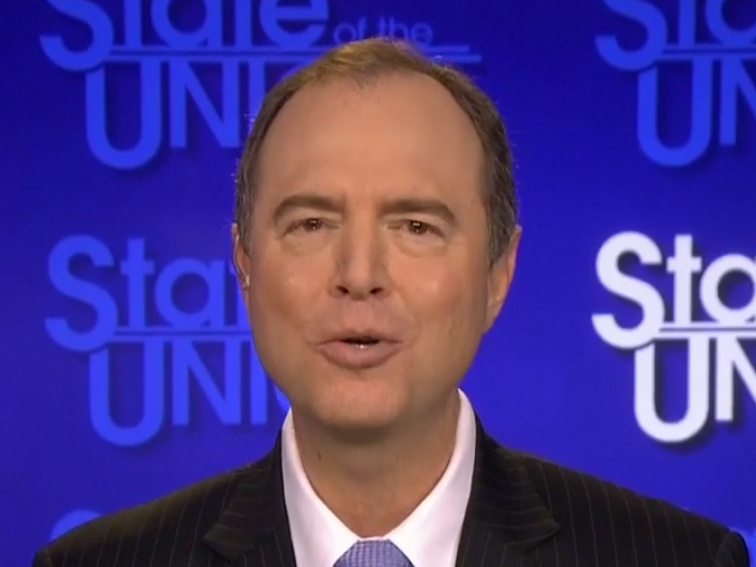The ranking member of the House Intelligence Committee told CNN on Sunday that he believed a draft letter written by President Donald Trump in early May, in which he detailed the reasons why he wanted to fire then FBI director James Comey, could be “further evidence” of obstruction of justice if it indicated that Trump was firing Comey to stymie the FBI’s Russia investigation.
Rep. Adam Schiff told CNN’s Dana Bash that he had not personally seen the letter, which is in the possession of special counsel Robert Mueller, but indicated that he was interested in reviewing it.
“We wrote to the White House after the claim was made that the president had tapes of his discussions with Comey, to ask about anything memorializing any conversations with Comey,” Schiff said.
He was referring to a tweet Trump posted three days after firing Comey, saying that “James Comey better hope that there are no ’tapes’ of our conversations before he starts leaking to the press!”
Schiff said that when the House Intelligence Committee requested any materials related to his conversations with Comey, the White House responded "by tweet and then by letter" saying that they had no such documents.
Trump put the letter together shortly after Comey's May 3 testimony before the Senate Judiciary Committee, during which he defended his handling of the investigation into Hillary Clinton's use of a private email server when she was secretary of state. The president was reportedly incensed after Comey acknowledged that his October announcement that the FBI was reopening its investigation into Clinton, days before the election, could have impacted its results.
The long weekend during which Trump put together the document at his Bedminster golf club began on Thursday, May 4, The New York Times reported on Friday. Deputy attorney general Rod Rosenstein was given a copy of Trump's draft letter on Monday, May 8, and then proceeded to write a separate memo as to why Comey should be fired.
Trump's lawyer, Ty Cobb, told Business Insider in an email Saturday that the letter has long been in Mueller's possession and its existence was known both to the special counsel's team, as well as to the Department of Justice, "which has had a copy since the day it was first discussed within the White House." He added there was "little, IF ANY, objection within the White House" to the letter, and that it focused primarily on Comey's "usurpation of powers and other erratic and inexplicable conduct."

Asked if the Department of Justice agreed with the president that Comey's behavior was "erratic," Cobb responded, "Clearly, as the long public [Rod Rosenstein] memo explains and as Comey's early and subsequent testimony have caused commentators to make forceful allegations of perjury and the newly disclosed related testimony of senior FBI officials make clear."
Cobb did not provide specific examples of perjury allegations, but Trump has maintained that Comey lied when he told the Senate Intelligence Committee in June that Trump asked him to drop the FBI's investigation into former national security adviser Michael Flynn.
If the draft letter firing Comey is "responsive to our letter, they need to produce it," Schiff said. "And it's probably far past time for our committee to subpoena the White House to make sure we get all relevant documents."
Legal experts say the letter Mueller is reviewing is possibly the most critical piece of evidence in Mueller's obstruction-of-justice case since Comey's testimony before the Senate Intelligence Committee in June, because it can give prosecutors a direct window into Trump's thinking shortly before he fired Comey.
"The best way to prove someone's intent is through their own words and actions," former federal prosecutor Renato Mariotti told Business Insider in an interview Saturday. "Here, you have a letter that was written by Miller, at the direction of the president, that contains what the president's thoughts were at that time."
Though the letter's full contents remain unclear, The Washington Post reported that it focused on what was perhaps Trump's greatest frustration with Comey: that the FBI director did not publicly announce, when he was leading the bureau's probe, that Trump was not personally under investigation.
"It's problematic for Trump if he fired Comey because he did not take actions in the investigation that would benefit Trump personally," Mariotti said. "That makes Mueller's case stronger."
Schiff told CNN on Sunday that if Trump and Miller explicitly said that the president was firing Comey because of the Russia investigation, it would be "further evidence" of obstruction of justice.
"Certainly it's consistent, or would be consistent, with what the president himself admitted, and the fact that it's in such sharp contrast to what they initially said - that this was about [Comey's] handling of the Clinton email investigation - is further evidence of an attempt to conceal the real motives," he added.
Though the White House initially said that Trump fired Comey based entirely on Rosenstein's and Attorney General Jeff Sessions' recommendations, Trump later said he had already decided to fire Comey, and that Rosenstein's recommendation sealed the deal.
His explanation changed again later on, when he admitted to NBC News' Lester Holt that he had fired Comey because of "this Russia thing," and that he was going to dismiss the FBI director regardless of Rosenstein's input.
Watch Schiff's interview below:
Natasha Bertrand contributed reporting.

